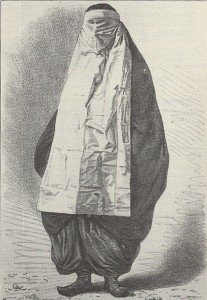
I’m aware that in writing this post that I am opening myself up to all sorts of charges of bigotry, anti-Islamic sentiments, and even racism. I don’t think I’m coming from such a place but I guess it’s in the nature of discussing Islam in the current environment. So be it.
For no particularly discernible reason, a good number of the teachers at my son’s pre-school are Muslim women who wear the hijab. I don’t find this remarkable. New York is a diverse place, and although I haven’t ever seen a child in the school wearing religious garb of any denomination, it has never seemed noteworthy that some of the teachers do.
One striking exception to that would be the substitute assistant teacher who wears an all-black chador. I remember the first time she was in JP’s class. We had arrived a little early and the three of us were the only ones in the room. I think JP must have met her before because he said a quick hello and went to one of the tables to start drawing.
I was a little stunned, mostly because I wasn’t sure what to do: as a man, do you address a woman wearing a chador? Do you ignore her? The most obvious response would be to act normally, ask her name, and introduce her to my son. But maybe that wasn’t the right approach.
I have met and spoken to devout women from just about every major faith: nuns, Orthodox women in wigs,Buddhist nuns in grey robes, Muslim women in hijabs. I will admit to being a bit more formal around them–I suppose you don’t tell dirty jokes to a nun–but not much more that. A woman in a chador, however, signifies a very different order of religious stricture.
I’m not in any way an expert on Muslim theology, but it has always seemed to me that the chador reflects a worldview in which interactions between the sexes are difficult, hostile, and potentially dangerous, with the ill behavior generally coming from men. If a woman chooses (or is forced) to retreat physically from the world it’s not up to me to question the decision–but it does imply that they might not want to talk.
If that is correct–and I freely admit it might not be–then addressing the teacher would be the wrong thing to do. That’s what I thought to myself in the classroom: a woman in a chador does not want a man speaking to her, looking at her, even thinking about her.
I found this rather irritating, though. She was my son’s teacher, in the school that I send him to, and was, even if only slightly, responsible for his care. I consider it appropriate to know her, have a sense of her personality and character, and yes, to be able to ask her direct questions relevant to the educational setting.
As I was thinking this–and tripping over my tongue–the teacher made things easy and addressed me, politely saying hello. This was, of course, another level of strange, too. Her voice, muffled by the chador, seemed to come from another part of the room. I looked away from her initially before realizing she had spoken.
I won’t say that entirely broke the ice, but it was enough for me to say hello back to her and even offer a little smile. No way to know if it was returned. I gave JP a quick kiss goodbye and left.
My last thought on the matter was that her clothing had placed me in an uncomfortable position, mostly, I suppose from my ignorance of the social rules surrounding devout Islam. I like to think of myself as an open-minded sort of person, but my thoughts had cycled through an entire roster of stereotypes about her–her husband was brutal and sexist; I pitied her for the restrictive life she leads, and the sexual fear that governs her understanding of religion; what would she have done if she had known I was Jewish?
None of it was fair, I knew. But it was what I thought.




